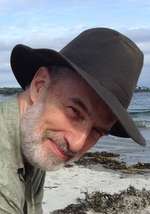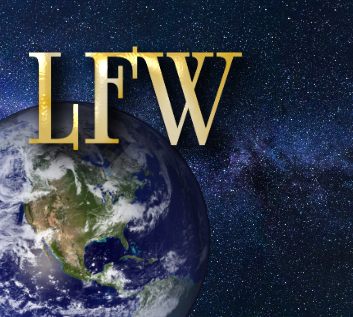The Last Person Apr 5, 2020 It was the expression on the woman’s face that had caught the monk’s attention. It was one of those quiet, inscrutable expressions that gnawed at one’s mind, begging to be understood, yet at the same time running in full retreat from the cruelty of gawkers. The monk had sat for a long time, staring at the harsh black and white photograph of the East Indian woman and her child, trying to quiet his mind and reach into the woman’s eyes that gazed down at the ground with utter resignation. The child pressed against her shoulder was frenzied, mouth wide with a cry of hurt and confusion, eyes bewildered with tears. Her left hand held him, fingers wrapped in his hair, while she leaned into her other hand with a weary desperation. The monk had studied the photo intently that day in the library, wondering which conflict had provided the wartime photographer with his involuntary subjects. The monk had a certain distaste for the frequent callousness of photographers who caught humanity in the midst of agony. He had often thought that they should throw their cameras down and pick up the victims instead. Yet on that day he was grateful that the photographer had clicked his shutter when he did. In the days after the monk had visited the library he had been unable to shake the haunting pain of the woman’s eyes—which was odd, really, since the shadows in the photograph had all but obscured her eyes, leaving only black pools of sadness. Her eyes followed him as he made his rounds, stumping his way through the hot Nevada sun, brushing the sweat off his forehead in irritation. Nevada had been hard on the monk. He had been thrilled to climb over the stony parapets in the desert, to sit baking on the granite while the air taunted him, bringing no relief. He hadn’t minded the heat in the desert, because he had been utterly enthralled with the idea that the stones he sat upon were contemporaries of humankind’s history. It was the lack of grass that had helped him sense the absolute age of the rocks around him, an age that stretched all the way back to the first ancestors of humankind. The starkness of the scene had hit him suddenly, as if it was a mute witness to thousands of years of tears and bloodshed. The monk could see why the old biblical prophets had been able to maintain their fervor in the desert. The atmosphere seemed to resonate with the feeling that God was present, and had been present throughout all the long years of war and attrition, silent and lonely and suffering. It wasn’t the desert that clawed at the monk’s soul, making him feel as if his skin was being ripped away while he helplessly watched. It was Nevada’s other side, the seamy underbelly of a beast that flaunted its bravado on billboards and in neon lights, at crap tables and on stages crowded with soulless dancers who beckoned to middle-aged men. The monk had fought against the city’s seduction, gripping his fists, clenching his jaw until his muscles twisted in spasm. He had come to discover that the strength of will by itself was failing him, leaving him weakened, twisting, clutched by the spiritual glue that crept along the night streets of Las Vegas and Reno. His superior had tried to help him one day, kindly explaining that spiritual laws were only useful as long as one wanted to follow them—and that one day he might simply decide to throw his vows and regulations in the trash. The monk had gulped a bit, but hadn’t really understood. Until now. He finally understood how utterly useless the law was in the face of overwhelming human desire. The cloying, winking sensuality of Las Vegas had beaten at the monk’s physical desires for so long that he no longer felt the power of moral restrictions. It wasn’t that he believed that restraint was wrong. He knew, from the top of his youthful head all the way to his sore feet, that he was a prisoner of his religious code. There was no escape for the monk, for he found it impossible to deny his belief that a life of purity was the best way to find happiness. His problem was that he no longer cared if he was condemned. In fact, he was certain that he would indeed be miserable if he finally cast his vows aside. His dark imaginings vividly created his future torment, an icy hell shut away in mud and gloom. It was the brothels that had tipped the scales toward perdition for the monk. He had stepped through their portals in the midst of his faithful errands, and had stood his ground against an onslaught of desire. Matters were worsened when he discovered that women of the night seemed rather nice—even polite. Surprisingly, they respected him, and told each other not to tempt him, for he was, after all, a nice boy of the church. He had stumbled away, unscathed in virtue, but poisoned by a vapor that clung and didn’t wash off. Surrounded by his friends, who seemed flawless to him, and more faithful, the monk had grimly maintained a façade of normalcy. He was grateful for the company of faith, for it was more difficult to run screaming toward the gates of hell when one’s friends were standing guard. It was thus that the monk greeted the news of his pioneer mission with a fear that sickened him. As an exercise of faith, he was to go to the northern city of Reno for forty days—without money, without lodging, and, worst of all, without a soul to protect him from himself. As he trudged through his first days in Reno, the monk’s trepidation was confirmed. The loneliness of being confronted with his own pockmarked soul was overwhelming. There was no escape from his self-examination—no crowd of friendly faces to distract him from the reality that his mind and faith were collapsing under the stress of a ruthless physical desire. The monk wandered, with no ability to work or spread the word. Because he was hungry, and didn’t want to sleep outside, he forced himself to ask for donations in store parking lots. As soon as he had enough money for a room and his daily meals, he would stop, too depressed to do more. He took to walking the streets, blindly pushing himself along without caring where he was going, without noticing where he ended up. He found a self-service laundromat that was warm and hospitable, a place where he could be ignored as he sat and stared at nothing in particular. Hours passed, and housewives glanced at him curiously. He was too dull to care, and buried his head even farther into the collar of his jacket. It was hunger, finally, that drove him to stand up and creakily walk out into the empty streets. Night had fallen, and the streetlights were no help at all to his bitter mood. Their light threw a blue sheen against the pavement as he marched defiantly, block after block. He had reached the conclusion that the suffering of hell was no longer a deterrent to his overwhelming desire. It seemed a reasonable bargain to the monk to trade eternal suffering in the distant future for a raucous life of pleasure in the present. The threat of punishment and the fear of hell no longer had the power to spur the monk toward a life of endless religious sacrifice. He began to wonder where he might go after casting off the trappings of religion. It occurred to him that he might find employment in a brothel. At least then he could enjoy himself before he died and was pulled into hell. As the monk passed house after house of sleeping occupants, his mood grew perverse, and he idly considered throwing himself in front of a passing car, thus ending his dilemma. He began to calculate, rather sullenly, the number of people who might grieve at his untimely death. At first he was certain that no one would miss him. No one would care. He knew it was true, for he was in a black mood without a trace of light. His self-pity deepened, and he began to think of all the people whom he knew, wondering in turn if they would be saddened by his passing, whether by fatal accident or by his descent into a life of hedonistic pleasure. The monk knew many people and, being a reasonably sociable person, had developed numerous friendships in his years of service. He hesitated, as he mentally skipped from person to person, questioning whether or not they cared about his miserable existence. His hesitation deepened as he continued, and he began to wonder if perhaps his friends might care about him after all. The night grew colder, and he shivered as he buttoned up his thin jacket. The idea that his friends might be saddened by his spiritual or physical demise began to take root in his heart, as he walked more and more slowly past the darkened houses. The monk began to worry about his friends’ reactions, and it occurred to him that they might feel grief when he was gone. It was the knowledge that they would grieve that turned him. He glanced at his reflection in the windows of cars that were already beginning to glisten with early morning dew. His face was pale and distraught, and he was startled by his look of exhaustion. The street that he was walking on reached an intersection, and the monk aimlessly wandered into a parking lot, where he sat and gazed at the mist moving across the shop lights. The monk was faintly surprised to find himself thinking about his friends and their feelings. He had been reveling in his own misery for so long that he found it strange to consider anyone else. The barren tint of the streetlights began to remind the monk of his epiphany in the desert. He had come away from his trek over the rocks with the conviction that God had endured a history of loneliness. As he sat shivering on the curb of the parking lot, with his chin in his hands, his sense of devastation was assuaged by the realization that his own loneliness was tiny compared to the heart of an abandoned God. Impervious to the roar of a caravan of trucks that barreled through the intersection, the monk finally crumpled, overwhelmed with sadness that he had forgotten God. He couldn’t stand the thought that God was lonely, and began to feel stirrings of a deep and abiding sympathy. As dawn streaked across the parking lot, bringing with it a clatter of delivery trucks, the monk rose stiffly and blinked rapidly. He felt thoroughly exhausted, but simultaneously refreshed in an unexpected way. He smiled at a young mother walking toward him, with three children in tow. He was delighted when she smiled back at him. The monk rubbed his unshaven chin ruefully, and wondered if people would find his rumpled appearance amusing. He spied a doughnut shop in the far distance and began to trudge toward it, anticipating with some eagerness the aroma of hot coffee. He smiled at people on the sidewalk as he passed them, hoping that he could brighten their day just a tiny bit. The monk liked people, and was beginning to remember how much he enjoyed serving them. He had spent many hours meeting people in their neighborhoods, and had always been touched by people’s reactions when he was able to care for their needs. People were streaming by on the sidewalk, and traffic was getting heavier as the sun rose higher in the sky. The monk began to wonder how many people he might touch with service or love during the rest of his life. He started to calculate how many years he would be alive, and how many people he would meet during those years. His stomach was growling by this time, complaining in a very undignified way about its neglect. Its loud digestive rumblings jogged the monk’s thoughts, and he started to wonder what would happen to the people he was destined to meet if he turned away from a life of service. In his reverie the monk almost stumbled over a rock on the sidewalk. Looking up sheepishly, he saw that he had arrived at the front door of the doughnut shop. He swung open the door and quietly sat down at the counter. Gazing around at the customers busily munching on pastries thick with cream and chocolate, he came to the quiet conclusion that hell could only be avoided when one wanted to avoid hell for the sake of others. He would either be there for people, or he would pass them by. Biting into his doughnut, he knew that he couldn’t ignore their suffering. The next day, the monk was surrounded by a stack of books at the Reno public library. The transformation in his heart felt very powerful, but he was worried about his immature heart and internal conflict. He was grimly certain that his body’s desires would prove recalcitrant, and would never easily surrender. He didn’t know exactly what he was searching for, but he wanted to find something that would help him remember the suffering of the people who would need his love in the future. The monk was convinced that his victory depended upon his desire to care for others. He thought it might have been God who guided him to find the photograph of the woman and her child. He was astonished when he saw it, for the woman’s face seemed to reflect all that he had gone through the night before. He looked at her sorrowful eyes and knew that someday in the future, a woman like her, with a child at her side, would need him. Not because he had anything particularly special to give to her, but simply because he would be there when the time came. The monk carefully copied the photograph that day, and later replaced it with an original page from a copy of the book that he purchased at a store. He carried the photograph with him in his travels, and placed it where he could see it frequently. He didn’t know if the woman was alive or dead, but secretly hoped that he would meet her someday. She had come to represent more than her own misfortune, in the monk’s eyes. He had begun to see her as a symbol of the person at the farthest corners of the earth, the last person to be liberated from suffering. The woman’s grief had given the monk the treasure of simplicity, the awareness that he could never rest if there was pain still left in the world.
The photograph mentioned in this story is on page 227 of the book The Camera at War, by Jorge Lewinski, published by Simon and Schuster, New York, 1978. ISBN: 0-671-25219-4 The photograph is by Donald McCullin.
(Comments are moderated and must be approved.) “The Epiphany of Zebediah Clump”
Watch our first film right here. |




 Peter Falkenberg Brown is passionate about writing, publishing, public speaking and film. He hopes that someday he can live up to one of his favorite mottos: “Expressing God’s kind and compassionate love in all directions, every second of every day, creates an infinitely expanding sphere of heart.”
Peter Falkenberg Brown is passionate about writing, publishing, public speaking and film. He hopes that someday he can live up to one of his favorite mottos: “Expressing God’s kind and compassionate love in all directions, every second of every day, creates an infinitely expanding sphere of heart.”





